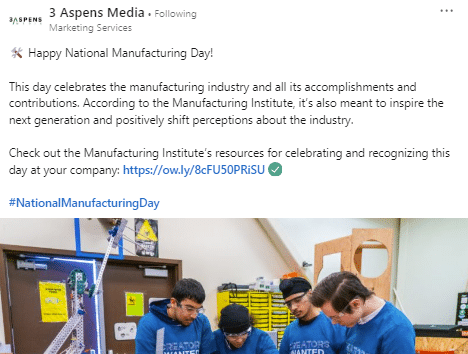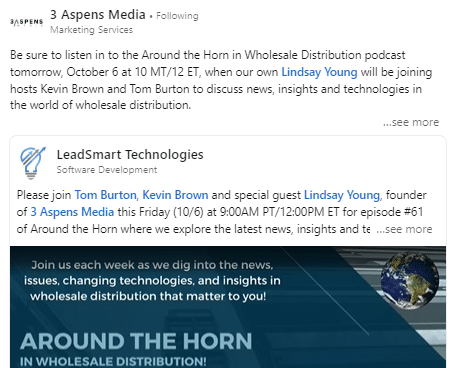Ok, let’s be honest: In this day and age, very few people are still wondering whether using social media benefits B2B businesses or not. The more common questions today are: Is it working? Am I doing it right?
That’s where planning and tracking comes in – i.e., strategy. How confident are you in your B2B social media strategy?
Does it feel inconsistent? Are you unsure which types of content to feature on your platforms? Do your posts come across as authentic? Are they supporting actual marketing goals and generating positive outcomes?
Having a social media strategy helps you achieve the consistency and authenticity you need to drive meaningful results. When you follow through on a comprehensive plan, the benefits will be clearer, more measurable and more significant.
So, why is social media important for B2B? And what are those benefits we mentioned?

An Active Social Presence Builds Brand Awareness and Credibility
Pushing your product or service may be top of mind when you’re building a brand, but establishing industry credibility is of equal importance.
What do we mean by that?
We mean showing existing and potential clients you’re a reliable source within the industry.
Are you educating yourself on the latest industry trends? Are you sharing newfound knowledge and perspectives from across the field? As stated in Forbes, establishing a social media strategy will help cement you as a thought leader within your respective field.

Social Platforms Help You Reach and Engage Customers
Social media is just that: social. Thus, it’s a perfect channel for customer engagement. When you have – and follow – a plan for customer engagement on your social platforms, you can establish trust amongst your existing clientele, prospects and industry network.
Customer engagement on social goes beyond simply posting to your account. It involves directly interacting with others and contributing to important discussions. For instance, are you acknowledging clients’ or customers’ comments and complaints? Are you engaging in industry conversations, as HubSpot suggests for social media success?
While social media platforms are great places to advertise upcoming sales or highlight new products, they’re also hubs for modern-day word-of-mouth advertising. Remember this when you’re deciding on content to share. What conversations do you want to be part of? What does your customer base care about? If you’re leading an important or engaging discussion within your field, that can be shared instantly – spreading awareness and deepening your connection with your target audiences.

Social Media Drives Traffic (Where You Lead It)
Awesome! You’ve reeled in some leads! Now let’s keep them moving in the right direction.
You and your team put a lot of time and energy into creating the perfect website to highlight all you have to offer the industry. Show us what you got!
For example, you might use social posts to:
- Highlight product testimonials and drive customers to the product page.
- Address an industry pain point and direct clients to an article offering solutions.
Keep in mind that not all posts have to be super fresh, original and creative. What matters most is that they’re relevant and serve a purpose, such as educating the audience or deepening customer loyalty. So, if you have older blogs or resources that are still useful to your social media audience, don’t be afraid to use them in your strategy just because they’re older.

Social Media is Perfect for Building Industry Relationships
In addition to using social media to increase your audience and customer base, it is also a great tool for establishing, building and maintaining relationships within your industry. These relationships can lead to partnerships and shared visibility across multiple company platforms.
At 3 Aspens Media, we support and inform many of our clients’ social media strategies as part of our content services. If you’re curious about the process or you just have questions about social media in general, don’t hesitate to reach out to [email protected].




